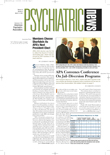Postmenopausal women who experience symptoms of depression have a 50 percent greater chance of developing or dying from cardiovascular disease than women without depression symptoms, according to a report in the February 9 Archives of Internal Medicine.
Researchers found that among a sample of more than 93,000 postmenopausal women enrolled in the Women’s Health Initiative Observational Study, 15.8 percent scored positive for depressive symptoms. Symptoms were determined with six items from the Center for Epidemiological Studies Depression Scale and two from the Diagnostic Interview Schedule. Women who previously had been diagnosed with mental illness were excluded from the study.
The Women’s Health Initiative is a long-term study designed to identify and explore a number of environmental and biological factors and their relation to health problems, such as heart disease, cancer, and osteoporosis, in older women.
Sylvia Wassertheil-Smoller, Ph.D., and colleagues investigated the link between depressive symptoms and cardiovascular problems, including heart attack and stroke, in 93,676 women aged 50 to 79 years who enrolled in the study between September 1993 and December 1998.
Researchers followed the women for an average of four years.
Wassertheil-Smoller is principal investigator of the Women’s Health Initiative at the New York Clinical Center and a professor of epidemiology and population health at the Albert Einstein College of Medicine in New York City.
When she analyzed the association between cardiovascular problems and depressive symptoms, she found that among women who reported having no lifetime history of cardiovascular disease at the baseline assessment, depressive symptoms were associated with a 58 percent greater risk of death from cardiovascular disease than in women without the symptoms.
Differences in risk of cardiovascular death between women with depressive symptoms and those without the symptoms were noted six months after the baseline assessment, according to the study.
After adjusting for a variety of health and lifestyle factors, such as diabetes, smoking, body mass index, and physical activity, the risk still remained high—women had a 50 percent greater risk of developing or dying from cardiovascular disease than women without depressive symptoms.
In addition, Wassertheil-Smoller found that women with depressive symptoms were 12 percent more likely to have hypertension and 60 percent more likely to have a history of stroke or angina.
Although other studies have found that subclinical depressive symptoms may be a risk factor for cardiovascular-related death, Wassertheil-Smoller pointed out that her study examined these risks in the largest sample of postmenopausal women to date.
The exact nature of the link between depressive symptoms and heart disease is unknown, she told Psychiatric News.
“We need a better handle on the mechanism through which this is operating. Is subclinical depression a prodrome to cardiovascular illness or does it actually play a role in the development of cardiovascular disease?” she asked.
She said she hopes one day to be able to analyze blood samples taken from subjects enrolled in the Women’s Health Initiative “to see whether we can identify biomarkers associated with both depression and cardiovascular events.”
In addition, she said, clinical trials are needed to test whether early identification and treatment of women with subclinical depression will lower risk of developing or dying from cardiovascular disease.
Arch Intern Med. 2004 164 289
